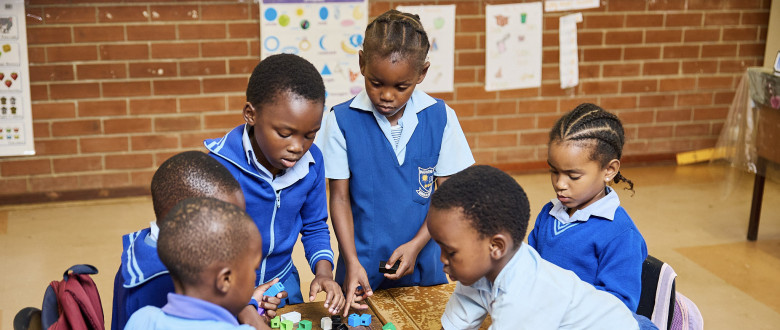
As early childhood education gets more room and press on global development agendas in a bid to achieve SDG4 by 2030, quality must not give way to quantity. In Africa and Asia, VVOB is engaged in collaborative efforts to embed play-based learning approaches to support quality education.
The importance of early childhood education cannot be overstated, especially in Africa where young children face numerous challenges that can have long-lasting effects on their growth and development as was highlighted at the Southern Africa Regional Conference on Early Childhood Development in Zambia in March 2023.
A recent state visit of Her Majesty Queen Mathilde of Belgium to an early childhood education centre in South Africa saw the Queen engaging young learners in reading and play-based learning activities. Accompanied by the Minister of Basic Education Angie Motshekga, Kerry Kassen of The LEGO Foundation, and VVOB in South Africa Country Programmes Manager Wilfried Theunis, the royal visit shone a light not only on the importance of early childhood education but also on the global collaboration and will to advance it.
Africa’s commitments
To prioritise young children’s growth and development, the African region has made several commitments such as The African Charter on the Rights and Welfare of the Child, The African Union Agenda 2063, Africa’s Agenda for Children 2040 and The Continental Education Strategy for Africa.
The recent Southern Africa Regional Conference sought to provide an opportunity to showcase innovative programmes in the sub-region and harness collective experiences to enrich the advocacy agenda and to strengthen policy and programme implementation for early childhood care and education.
Among the 280 conference participants, were eight staff members from VVOB’s Zambia and South Africa programmes. Reflecting on the challenges of early childhood education in the region, Zanele Sibisi, Education Advisor for VVOB in South Africa, remarked that one the key takeaways from the three-day event was “the increasing need to devise innovative ways of increasing access to quality early childhood development and education services especially to the marginalised.” In addition to this, added Zanele, it is imperative that those working in early childhood education be part of, and understand the early childhood education agendas at the policy level as well as implementation level.
Learning through play and collaboration
Learning through play is increasingly being recognised and included in the development agendas of African and Asian countries where VVOB is working. Many countries in these regions are working to incorporate play-based learning approaches into their education systems. For example, in 2019, ADEA, together with the Ministry of Basic Education of South Africa, UNICEF South Africa and the LEGO Foundation, organised the first Continental Conference on Play-based Learning for the 21st Century Skills also known as Africa Play Conference (APC) to foster dialogue on approaches, resource allocation, teacher development and support materials for the implementation of equitable education outlined in the Continental Education Strategy for Africa (CESA 16-25). Similarly, the second Asia-Pacific Regional Education Conference held in 2022 emphasised the need for the continuous capacity building of teachers for play-based teaching.
In Africa, VVOB is implementing learning through play initiatives, with support from The LEGO Foundation, in Rwanda, Uganda, Zambia and South Africa. In February 2023, VVOB, in partnership with the Ministry of Education and Rwanda Basic Education Board, organised a study visit between Ugandan, Zambian, and Rwandan government representative to increase knowledge of learning through play methodologies and develop a shared vision on play-based learning in early childhood education. The study visit allowed representatives to observe good practices and discuss policies to strengthen early childhood education systems.
During the visit, pre-primary teacher Rosine Simbi in Muhanga district, Rwanda, shared the key insights she had gained from training in learning through play metholdogies for emergent numeracy. “Before the training I would write numbers on the black board and ask children to repeat them after me. I was using play only as an energiser to avoid sleeping in class ... when I attended the training, I learnt how children learn through play”. Since facilitating learning through play in her class, Rosine says her work has become easier, adding “learning through play, I let children think, explore…they enjoy playing and love learning.”
Rosine’s example is a testament to the importance of training and professional development opportunities for teachers. However, as early childhood education gets more take up on education agendas around the world, especially as pressure mounts for achieving the targets of SDG4 by 2030 – which includes at one least one year of free and compulsory quality pre-primary education provided by well-trained teachers (UNESCO, 2015a) - quality as well as quantity must remain a priority.
There are growing concerns on whether increasing the quantity of pre-primary classes and children risks paying less attention to the human resources for quantitative and qualitative growth in this sector.
Championing quality
Across all the countries we work in, our close partnerships with governments enable government ownership of education programmes which is paramount to ensuring sustainable service delivery of quality education and effective system-level change. Central to this, is ensuring professional development for educators is tailored, practical, contextually relevant and ongoing. In our work, we are using blended professional development trajectories that embed play-based learning approaches to ensure school leaders and teachers are strengthened to provide engaging learning experiences to their learners. As the World Bank puts it, there must be a focus on “championing quality, not just access”.




